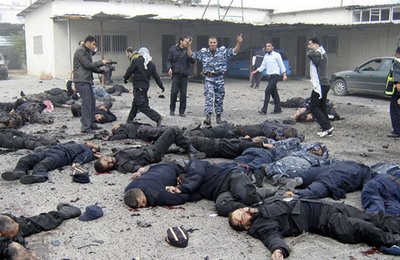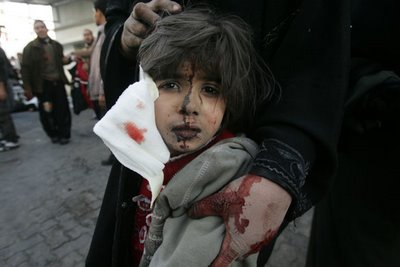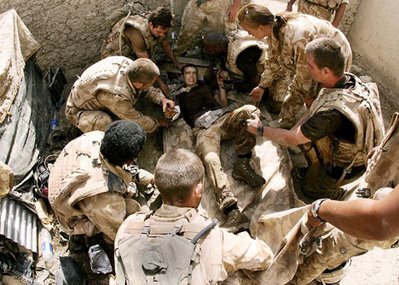We are all Gazans now.

 To call some of the language used by Israeli leaders and others to defend the mass murder being visited on Gaza sickening is to not even begin to do justice to the immense suffering of the people of that benighted territory. Some are more coy than others, trained over years to be more sensitive towards those who might not understand just how dreadful things are to be an Israeli when suicidal terrorists fire rockets at you every day. When one citizen of Sderot then calls the 320 and rising deaths in Gaza "fantastic", we somewhat accept it, knowing that she herself has suffered from the rain of missiles which often fall on her home town.
To call some of the language used by Israeli leaders and others to defend the mass murder being visited on Gaza sickening is to not even begin to do justice to the immense suffering of the people of that benighted territory. Some are more coy than others, trained over years to be more sensitive towards those who might not understand just how dreadful things are to be an Israeli when suicidal terrorists fire rockets at you every day. When one citizen of Sderot then calls the 320 and rising deaths in Gaza "fantastic", we somewhat accept it, knowing that she herself has suffered from the rain of missiles which often fall on her home town.Israeli officials themselves cannot be quite as honest, nor quite as cruel. The closest they have come is Ofer Shmerling's remarks to al-Jazeera that he would "play music and celebrate what the Israeli air force is doing." The same men and women that wax lyrical and play imaginary violins about how Sderot is under constant siege, how Israel disengaged from Gaza and all it got in return was rocket fire think nothing of openly celebrating the death currently being unleashed from the sky. One drop of Israeli blood may as well be worth one Palestinian life, such is the disparity between the two.
Most enraging and troubling though are the euphemisms, the distortions of language, the unmitigated Unspeak being directly practised by the likes of Tzipi Livni and Ehud Barak. Livni talks of "changing realities" in Gaza; what she means is destroying every single thing that has a connection to Hamas, however slight. In practice, what this "changing of realities" means is the targeting of a single police officer with a Hellfire missile. As most of the police officers in Gaza are members of Hamas, this apparently makes them, at least in Israeli eyes, completely legitimate targets. That most of them have nothing whatsoever to do with Hamas's security apparatus is irrelevant, that some of them were traffic cops and that some of them were only in training also makes no difference. They are therefore not considered to be civilians, so according to the UN "only" around 70 have been killed so far, although they call it a conservative estimate. At least seven civilians were killed in that strike at just one police officer, yet this is not regarded as a terrorist act. When a Palestinian stabbed three settlers in the West Bank, almost certainly as an act of revenge for the on-going operations in Gaza, the Israelis wasted no time in describing him as a terrorist. Both acts are equally indefensible, yet the international community, especially the US, goes out of its way to condemn Hamas while not even so much as chiding Israel for the way it has decided that all-out war against an elected party of government is a perfectly acceptable course of action. Livni's "changing of realities" means that Gazans will loss relatives, friends, brothers, sisters; a very brutal changing of realities. Yet she hides behind her words, condemned by no one outside of political commentators.
Ehud Barak, the "defence" minister, made a highly similar and familiar comment. He said their "intention is to totally change the rules of the game". Tony Blair said almost the same thing after the 7/7 terrorist attacks in this country, leading directly to the government's attempt to introduce 90 days detention without charge for "terrorist suspects". Yet Israel's rules of the game have not changed: just like in 2006 when ambulances, airports, power stations and the Beirut suburbs were all legitimate targets, in Gaza today universities, mosques, police stations and lone officials that may or may not be connected with Hamas can be either obliterated or smeared across the pavement with impunity. The only thing that has changed is that the Kadima government has decided that with six weeks to go before an election that Likud, its right-wing rival is likely to win, now is the time for all-out war against Hamas. For the Gazans, this changing of the rules means that the slow stranglehold they live under has been transformed into one where more than 0.2% of their population can be wiped out without anyone hardly batting an eyelid. 0.2% of the American population would be 61,011; more than 10 times the 3,000 deaths which were enough for a war on terror to be launched that is without apparent end.
When attacks on the person are being carried out so brazenly, attacking the language which justifies it might seem perverse. It is however the twisting of language, the refusal to spell out what such spinning means in the "reality on the ground" that helps stop those responsible from being held to account. War crimes, like in Lebanon in 2006, are being committed by both sides. It just so happens that the war crimes of only one side are, as then, being denounced.
Labels: Gaza, Gaza blockade, Gaza December 2008 raids, Hamas, Israel, Israel-Palestine, language abuse, Unspeak, war crimes


